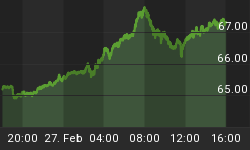Risk is becoming a nasty four letter word. Stocks are down for the year, junk bond holders are lightening up as credit spreads widen, and it's likely that GM and Ford won't be the only big issuers to see credit downgrades now that the credit cycle has turned. Hedge Funds are also struggling to see positive returns, commodities are well off their highs, and even gold and silver stock investors have recently been taken to the cleaners. Virtually every investor in almost every asset class, who has placed bets, has suddenly discovered that they are actually a losing speculator.
So, is anything offering a positive return these days? Have we all forgotten about plain old cash? Short-term interest rates are raised every six weeks - the Federal Reserve has raised the yield on cash eight times in a row! Moreover, with inflation in the CPI well entrenched at over 3 percent a year, there is more tightening to do. Indeed, unless there is a real market crash or the economy looks like it is dead in the water, the Gods and the odds favor the yield on cash rising. Each time interest rates are raised, the yield curve flattens more like a pancake taking all of the easy profit out of the carry trade. The markets are getting nervous, stock prices are up and down like a yoyo, and volatility is back.
With over 40 percent of profits at S&P 500 companies tied to financing activities, rising interest rates can deflate this profit balloon. With the yield on cash increasing, price volatility in the stock and bond markets favor the down side of the market.
So who's making money these days? My wife is! I gave up trying to persuade her to buy racy investments like physical gold and silver; they're too volatile for her. She simply wanted an investment that was safe and would give her a return on her money, even if it barely kept up with inflation. So, over the last few years she has purchased I-Bonds which are sold directly by the United States Treasury http://www.savingsbonds.gov/.
(I-Bonds pay a fixed interest rate plus the CPI and taxes on the interest are only due when the bonds are cashed in. There is no fee involved and you can only buy $30,000 a year.) Last week, my wife showed me her investment returns since 2001 when she first began buying I-Bonds. I was quite impressed.
| I-Bond Yields | |
| Time Period | Tax-Deferred and U.S. Treasury Guaranteed |
| May 2005 - Oct. 2005 | 4.80% |
| Nov. 2004 - April 2005 | 4.60% |
| May 2004 - Oct. 2004 | 4.60% |
| Nov. 2003 to April 2004 | 4.70% |
| May 2003 - Oct. 2003 | 4.70% |
| Nov. 2002 - April 2003 | 5.21% |
| May 2002 - Oct. 2002 | 5.62% |
| Nov. 2001 - April 2002 | 5.62% |
(An I-Bond's composite earnings rate changes every six months after its issue date. For example, the earnings rate for an I-Bond issued in March 1999, changes every March and September).
For those who just want to save, keep up with inflation and assume no risk, cash or I-Bonds are the best anyone can do. The reason is, since the NASDAQ had its major decline in 2000, the Federal Reserve has been determined to make sure there is no return on capital. They did this by dropping short-term interest rates to an emergency 1 percent, encouraging speculators to make risky trades, and by creating an inflated housing market. This was their way to keep the economy moving forward. Now, they are ever so slowly shifting the balance towards savers and against the risk takers.
My tendency is to speculate - being short stocks looks better than being long - and physical gold and silver look good for long-term investment. However, my wife keeps reminding me that risk-taking could mean lost principal. As simplistic as this may sound, she instinctively understands the power of compound interest. Slow, steady, and consistent gains without losses, will almost always beat a portfolio with volatility "because if you have a loss, you need a massive gain just to break even."
More people are starting to think and act like my wife! With the yield on cash going up, the thought of being a saver with a guaranteed return is starting to look attractive to more savvy investors. With stock prices down for the year, retail stock investors, one by one, are realizing they have been conned by Wall Street into believing they are investing in stocks when, in reality, the middle class investor is suckered into buying stocks at the top and they ultimately end up holding the bag if the stock market tumbles. The markets are looking mighty risky and even hedge funds don't know if there is any real trend. You should start thinking about putting your stash in cash because cash is no longer trash; it's King again.















